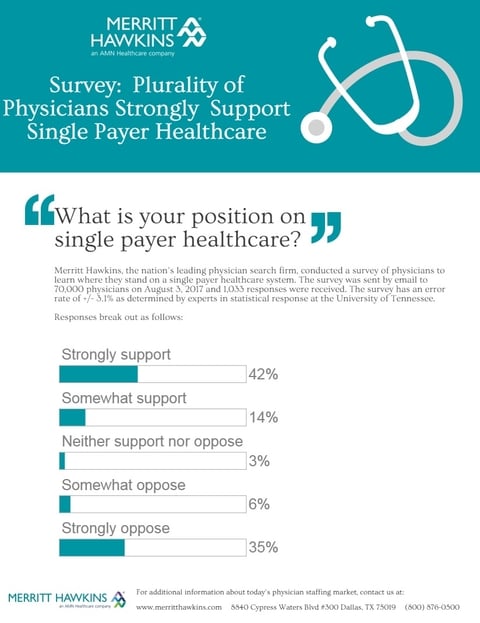More and more doctors now say they endorse a single-payer healthcare system, a big shift from the past.
A new survey of 1,033 physicians indicates that more than half of doctors (56%) either strongly support or somewhat support a single-payer system, according to Merritt Hawkins, which sent an email survey to doctors earlier this month.
RELATED: Special Report—8 ways to fix the Affordable Care Act
The results indicate a near reversal of a national survey the company conducted in 2008, which indicated 58% of physicians opposed a single-payer system at that time, while 42% supported it.
“Physicians appear to have evolved on single-payer,” said Travis Singleton, senior vice president of Merritt Hawkins, a physician search company. “Whether they are enthusiastic about it, are merely resigned to it or are just seeking clarity, single-payer is a concept many physicians appear to be embracing.”
In the newest survey, over one-third or 35% of physicians said they strongly oppose a single-payer system, while 6% were are somewhat against it. Some 42% said they strongly support such a system and an additional 14% are somewhat supportive.

The flip-flop in doctors' support for a single-payer system echo the changing political tide. The 2008 survey was conducted the year Barack Obama was elected president and before the Affordable Care Act (ACA) was adopted in 2010.
RELATED: Price signals support for bipartisan healthcare reform fix even as Trump trades barbs with McConnell
In the ongoing healthcare reform debate and Republicans' failed bid to repeal and replace the ACA, support has grown among doctors for a single-payer system to provide healthcare to all Americans. Physician organizations have strongly opposed efforts to repeal the ACA if it means the loss of insurance coverage for patients.
The Merritt Hawkins study is in line with a LinkedIn survey in February that found almost half of doctors support a single-payer system. Doctors said the current fragmented system is a barrier for patients who either don’t have health insurance or can’t find a doctor who accepts their coverage. It would also be more efficient and eliminate the administrative burden of dealing with multiple insurance companies, they said.